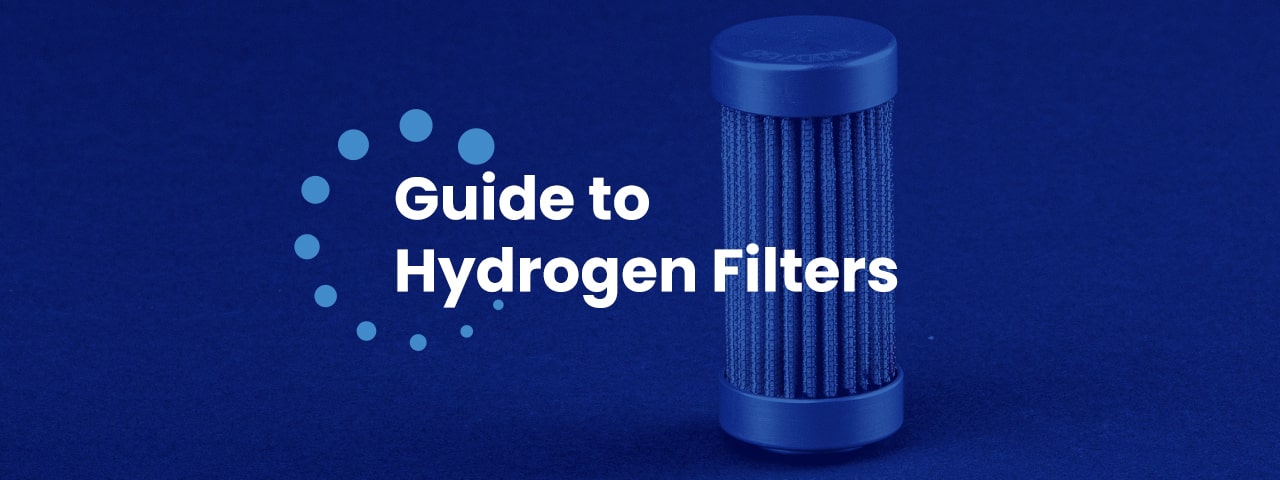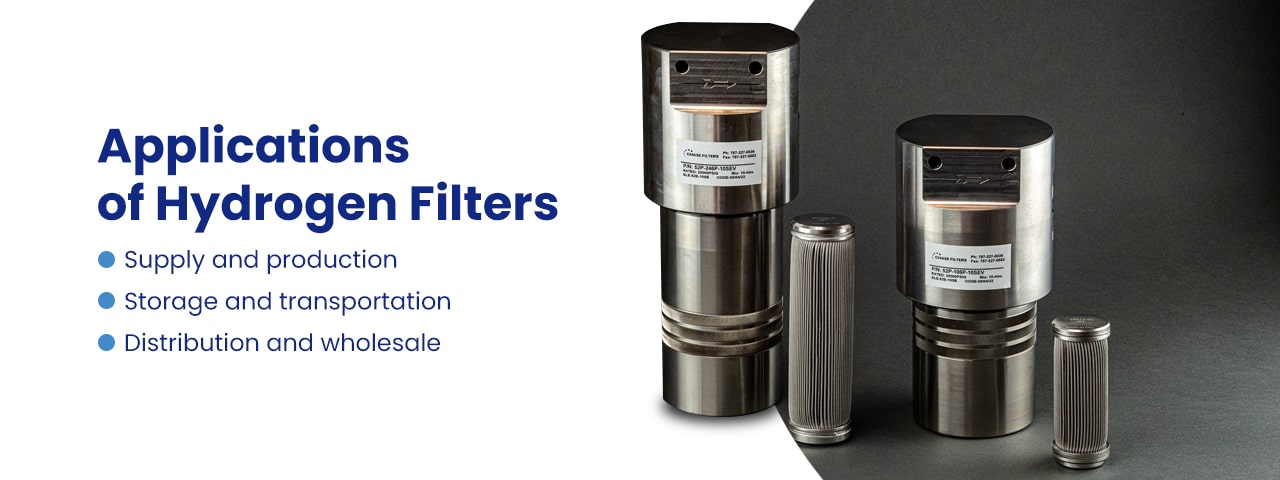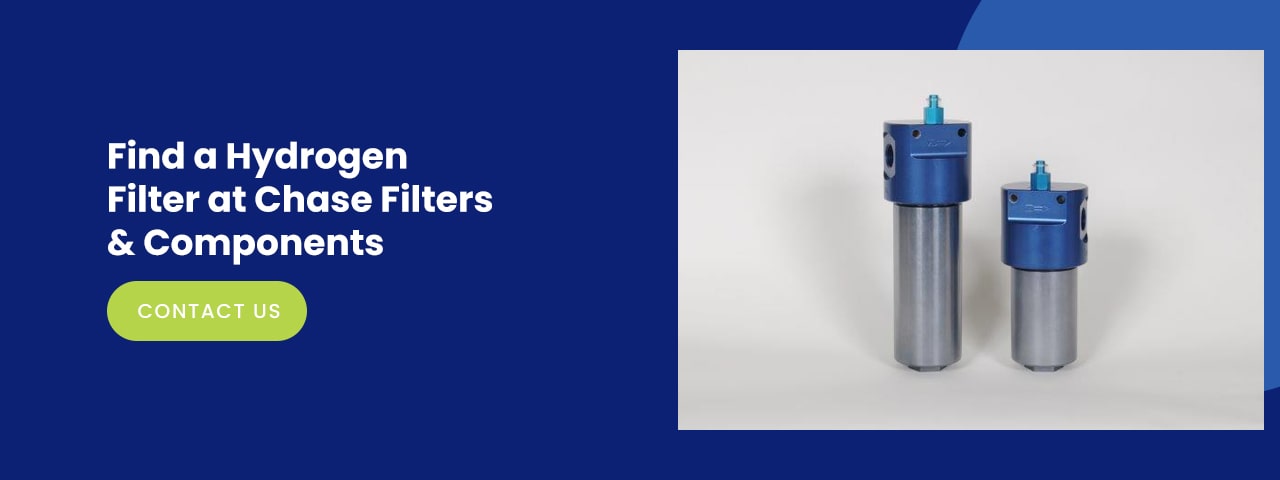January 19, 2024
Guide to Hydrogen Filters

Jump To:
- What Are Hydrogen Filters?
- Types of Filters You Can Use With Hydrogen
- Applications of Hydrogen Filters
- Benefits of Hydrogen Filters
Hydrogen (H2) was one of the first elements to exist in the universe and is also the most abundant. It is known for being the lightest and most straightforward of all the elements, though it also contains a high energy content, meaning it can be used as an energy carrier. As an energy carrier, hydrogen can be transformed into electricity, used for heating and cooling purposes, transportation in automobiles, trains and various industrial applications.
Due to the process of creating hydrogen and its various stages in the industry, it’s essential to use filters to sustain the quality of hydrogen, so it’s not full of contaminants. Below, you’ll learn more about hydrogen filters and how to use them in your applications to maintain the quality of your fuel supply.
What Are Hydrogen Filters?
High-pressure hydrogen filters help protect hydrogen and the components of your system against contamination that could cause damage, extending the working life of your system. Hydrogen production requires that you separate it from the molecules where it occurs. The two most common sources and production methods for hydrogen include electrolysis and steam-methane reforming. Both processes use electricity to split water (H2O), releasing hydrogen and oxygen. The oxygen is released into the atmosphere or collected for other industrial applications.
During these processes, large amounts of water can be left over that need to be removed to create a pure hydrogen product. As a result, you need to use hydrogen filters to separate the liquid from the gas.
Hydrogen filters are a subgroup of high-pressure hydraulic filters. High-pressure filters are typically located downstream from your system’s pump, but upstream of the components they protect. These filters are designed to handle high system pressure and are sized for the flow rate in the line where they’re located.
Once hydrogen is created, there are different ways to store it. You can choose to store hydrogen as either a liquid or gas. To store hydrogen as a gas, you will need high-pressure tanks that reach 350-700 bar or 5,000-10,000 pounds per square inch (psi). If you decide to store hydrogen as a liquid, the element requires cryogenic temperatures due to the boiling point of hydrogen being -252.8 degrees Celcius, or -423.18 degrees Farenheit.
Types of Filters You Can Use With Hydrogen
Chase Filters & Components has created high-pressure systems for hydrogen applications. We’ve created two hydrogen filter housings that can help you meet your needs:
51 Series
Our 51 Series T-Type hydraulic filters are ideal for hydrogen applications. These filters are rated at 5,000 psi Operating Aluminum or 6,000 psi stainless steel, and all three element types are available in this series. These filters help remove damaging contaminants from hydrogen to ensure your systems can operate as efficiently as possible.
Different contaminants that these filters can remove include dirt, rust, scale and more. They boast impressive features, including differential pressure indicators, a wide range of micron ratings, bowl drain options and a significant variety of O-ring potentials for custom fluid filter applications.
43N Series
We also offer the 43N Series T-Type filter, another hydrogen filtration option. These filters feature Nitronic housings for up to 30,000 PSI operating pressures. Like the 51 Series, you can choose from various micron ratings. You can also select micro-glass, porous sintered stainless steel, fiber metal felt or typical stainless steel for your elements. These filters feature high flow rates and different port sizes. The 43N Series is ideal for removing contaminants from your hydrogen product.
Whether you choose the 51 or 43N Series filters, both can remove contaminants from hydrogen and protect your elements, extending the life of your system.
Applications of Hydrogen Filters
Hydrogen filters can be used across various industries, including when using hydrogen as an alternative fuel source. Some of the applications of hydrogen filters include:
- Supply and production: Producing hydrogen with other elements, such as H2O, can leave contaminants behind, like water. Hydrogen filters can make quick work of this job. Some applications of these filters in supply and production include electrolysis, steam-methane reforming, coal gasification and power-generating systems.
- Storage and transportation: If you’re storing or transporting hydrogen, you’ll need hydrogen filters to keep your high-quality product. Different applications for hydrogen filters in storage and transportation include liquified hydrogen tankers, pipelines and high-pressure tube trailers.
- Distribution and wholesale: One of the primary uses of hydrogen today is in ammonia industries and oil refining, with emerging applications in synthetic natural gas production, metal refining and fuel cell vehicles. Thousands of hydrogen fuel cells exist across the U.S. for forklifts, commercial vehicles and backup power units. Other hydrogen filter applications include trains, ships, power grids, heating grids and hydrogen fueling stations.
Regardless of your industry, if you’re using hydrogen, it’s essential to implement hydrogen filters to protect your product from contaminants that could damage the quality of your fuel or your system’s components.
Benefits of Hydrogen Filters
Hydraulic filters used for hydrogen products have many benefits for numerous industries. One of the primary and most notable benefits of these filters is their ability to extend the life of your system and its components. These filters help limit the intake of contaminants and remove new ones, ensuring you have an impurity-free gas or fluid.
Another benefit of these filters is that they help protect your components and system from failure since particle build-up between lubricated mechanisms or close-fitting parts can cause damage. Preventing wear and tear reduces the risk of malfunction and keeps systems safer. Preventing damage also helps you reduce downtime and save on costs associated with replacing equipment and getting behind schedule.
Ensuring that your hydrogen filter suits the needs of your equipment before problems occur will help prolong your system’s life and allow you to operate more efficiently.
Find a Hydrogen Filter at Chase Filters & Components
Chase Filters & Components has over 30 years of experience in the hydrogen filter market, allowing us to help you find the proper filter size and type for your applications. We offer a wide range of filters for numerous industries, including our high-pressure hydraulic filters. Our 51 and 52 Series are ideal for hydrogen filtration, helping to protect your system from damage and keeping your final product clean from contaminants.
Our filters can withstand high pressures, temperatures and corrosion. We can help you save on downtime, maintenance and replacing or repairing components. We have fast turnaround times and can help you find a custom solution that meets your application needs. We can guarantee 99% efficiency with our elements, ensuring you get a high-quality product when you work with us. Our representatives can help guide you in the right direction for everything you need. Contact us today to learn more about our products and how they can revolutionize your hydrogen filtration.

